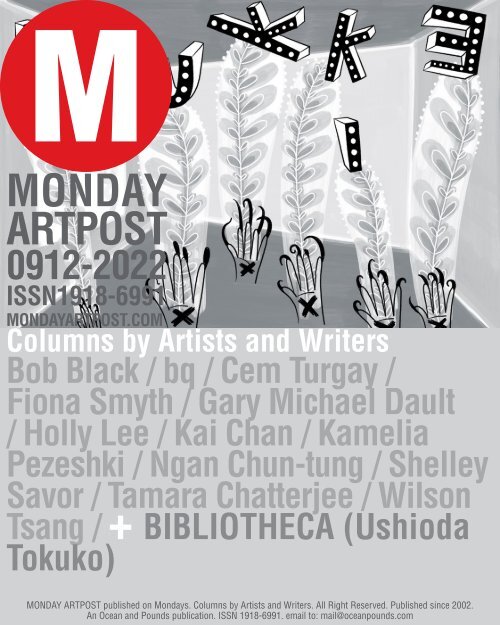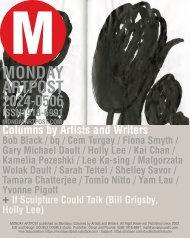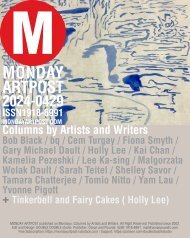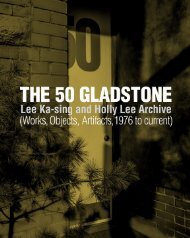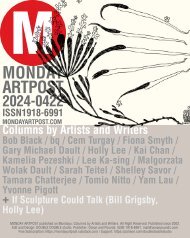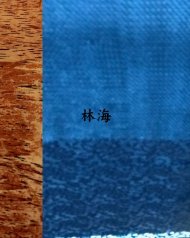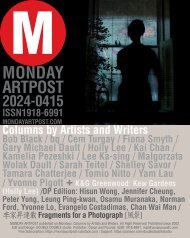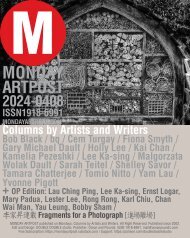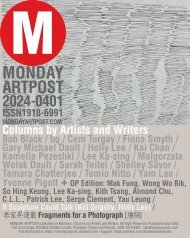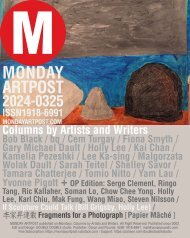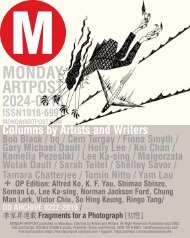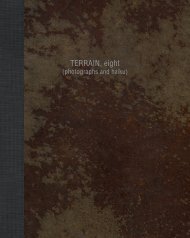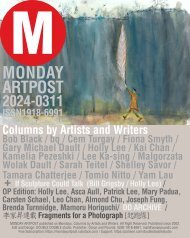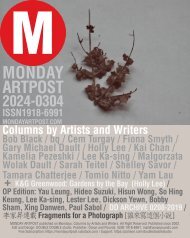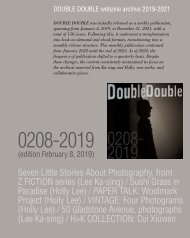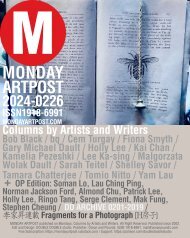Create successful ePaper yourself
Turn your PDF publications into a flip-book with our unique Google optimized e-Paper software.
<strong>MONDAY</strong><br />
<strong>ARTPOST</strong><br />
<strong>0912</strong>-<strong>2022</strong><br />
ISSN1918-6991<br />
<strong>MONDAY</strong><strong>ARTPOST</strong>.COM<br />
Columns by Artists and Writers<br />
Bob Black / bq / Cem Turgay /<br />
Fiona Smyth / Gary Michael Dault<br />
/ Holly Lee / Kai Chan / Kamelia<br />
Pezeshki / Ngan Chun-tung / Shelley<br />
Savor / Tamara Chatterjee / Wilson<br />
Tsang / + BIBLIOTHECA (Ushioda<br />
Tokuko)<br />
<strong>MONDAY</strong> <strong>ARTPOST</strong> published on Mondays. Columns by Artists and Writers. All Right Reserved. Published since 2002.<br />
An Ocean and Pounds publication. ISSN 1918-6991. email to: mail@oceanpounds.com
A number of WAYS to not miss your weekly<br />
<strong>MONDAY</strong> <strong>ARTPOST</strong><br />
Subscribe inbox Notifications about new issue<br />
https://oceanpounds.com/pages/artpost<br />
Browse OCEANPOUNDS front page<br />
https://oceanpounds.com<br />
Visit OCEAN POUNDS Reading Room<br />
https://oceanpounds.com/blogs/rr<br />
Follow FACEBOOK Page<br />
https://facebook.com/mondayartpost<br />
“Love is an irresistible<br />
desire to be irresistibly<br />
desired.”<br />
Follow INSTAGRAM<br />
https://www.instagram.com/oceanpounds<br />
Follow TWITTER<br />
https://twitter.com/ocean_pounds<br />
Join PATREON membership<br />
https://patreon.com/doubledoublestudio<br />
Robert Frost
From the Notebooks<br />
(2010-<strong>2022</strong>)<br />
Gary Michael Dault<br />
From the Notebooks, 2010-<strong>2022</strong><br />
Number 154: Putto with Appetite (September 5, <strong>2022</strong>)
TANGENTS<br />
Wilson Tsang<br />
dreamy era
Caffeine Reveries<br />
Shelley Savor<br />
Reign/Rain
Everything went quiet for a while, things were alternately restful and terrifying,<br />
pandemics can do that to communities. It was easy to notice nature, the skies were<br />
clearer, wildlife took over the streets, the earth was breathing easier, all while a<br />
deadly virus loomed. There is always a threat to disturb the balance of things,<br />
however the threat is caused.<br />
The weight of worry was heavy, so I looked up. Constantly moving shapes and<br />
colours; blue, grey, rain, snow - clouds are busy. The sky continually inhaling and<br />
exhaling.<br />
I looked down. Dirt, soil, mud, leaves, mushrooms, the universe of mycelium<br />
beneath our feet silently keeping the earth alive. The earth breathing.<br />
Mushrooms and clouds holding everything together.<br />
These sculptures, drawings and collages were made over the past few years during<br />
the pandemic. Nature provided an inspiring refuge from anxiety.<br />
Threats of global warming, nuclear annihilation, pollution, viruses, war - us humans<br />
have a bad track record. Look up, look down, breathe in, breathe out.<br />
Mushrooms and clouds (but no mushroom clouds).<br />
(Shelley Savor)
Mushrooms and Clouds (but<br />
no Mushroom Clouds)<br />
Paperback Edition<br />
56 pages, 8”x10”, perfect bound.<br />
Published by OCEAN POUNDS.<br />
Order paperback edition at BLURB (CAN$35):<br />
https://www.blurb.ca/b/11270926-mushrooms-and-clouds-but-no-mushroom-clouds<br />
ebook (US$5.00), pdf download. Bonus: access code for read-on-line edition<br />
https://oceanpounds.com/products/mushrooms-and-clouds-but-no-mushroom-clouds<br />
Pick up your reserve copy at the BOOK LAUNCH, pre-order today at<br />
OCEAN POUNDS or before September 15. Enquire at: mail@oceanpounds.com<br />
This book was published on the occasion of the exhibition Mushrooms and<br />
Clouds (but no Mushroom Clouds), held at 50 Gladstone Avenue artsalon in<br />
Toronto, October 1-29, <strong>2022</strong>.
Leaving Taichung<br />
Station<br />
Bob Black<br />
The following poem, Hong Kong: Songs from the<br />
Rooftops, is an 8-part poem that was written over the<br />
course of the last 5 years. Each part corresponds to<br />
a part of Hong Kong and each part also is dedicated<br />
to a friend. It was completed this past spring. This<br />
poem is dedicated to 8 friends, for whom the city<br />
is a constant conversation in my head and heart,<br />
regardless of the shape and tune.<br />
This poem is dedicated to: Holly & Ka-sing Lee,<br />
Nancy Li, Kai Chan, Yam Lau, Chris Song and Ting,<br />
TimTim Cheng, Tammy Ho and Kristee Quinn.<br />
May they always be filled with voices, food and<br />
sound. Carry on.
Hong Kong: Songs from the Rooftops<br />
“In these shaken times, who more than you holds<br />
In the wind, our bittermelon, steadily facing<br />
Worlds of confused bees and butterflies and a garden gone wild”<br />
-- 梁 秉 鈞 , Bittermelon<br />
VIII. Hong Kong, 香 港 : Rooftops and Mouthtops<br />
And who shall share in the joy under which the trees and shadow grow<br />
There is no pronoun for me, the eye in the I, the her in the he<br />
the dressing for the end, clothed in the typhoon, the ghosts emerging from<br />
the sea of the skulls backhoe, the back housing, the barking, the barkyard the<br />
backhoe singing<br />
redux:<br />
I am you who (plura) are thinking of journeys, our windward, fire-burned<br />
settlings, we hunger, ghost taste hungry, seed and flax set to flame and the<br />
crackle of ancestor, broken tooth, dappled stone and earth wing--<br />
the East Coast of Taiwan, a forlorn train station in Taiwan: Duoliang 多 良<br />
piggybacking one family lilting home, this stop and step and de-railing, all<br />
its waving, undulating wayward aspiration, memories per which--Eastward<br />
bound, their heart grows wild from seed and surf and suffrage light our thirsty,<br />
voracious selves, the child fingering soot and scenic swipes, repeat,<br />
the ghosts must be fed and so must we<br />
There is no pronoun any longer<br />
Shadowed by the lone tree<br />
the rooftops of Hong Kong, the mouthtops of our singing of our bodies buckling<br />
into one another as we run through lane and life and galloping against one<br />
another in the street in the back rooms as our bodies are met by politic and<br />
bitten bruise, as we fuck ourselves into life as we run from being fucked by<br />
batons and boots and long upturned plastic choking of men, our hearts licking<br />
one another’s words and limbs all our desire a pointing toward something, to<br />
restore silence to the murmur of our consciousness, the life of this city. the stones<br />
in our pockets, sucked like lychee and pepper, the grey small pebbles we finger<br />
and place in on our tongues when we weary from July humid heat and the new<br />
leaders come down from the dragon city, familiar evenings return. Wandering<br />
in the early hours alone. The quiet magic one bares witness to. A portal into the<br />
mind’s eye. If only they could see there is no.<br />
pronoun for me, dressing for the end, clothed for the typhoon<br />
to rhyme the darkness with ringing, song and shell,<br />
and the grattle and grass rattle beneath you<br />
from the rooftops, the world<br />
a kettle of ghosts, swaying<br />
And you held the brass box lock oxidizing and stiffening<br />
the matter of the matrilineal compass of the sky and the city:<br />
your heart<br />
hong kong, temper tiger, tempress lunar home<br />
we eat. in order to eight, we ate into order right, we write in order to blacken through the deepened<br />
cave of trooping hate, from which no lo mein came, no vernacular self, no long rung wrong<br />
to return to the echoing, the murmurs of silence, ringing<br />
to return to the life belled fully in that city of language and light and liquid luminescence<br />
alive and dying, alive and going, alive and leaving<br />
heart flesh, ghost skull, housed beneath the umbrellas yellow<br />
A fuselage of words, the rain of our temper and a rarity<br />
or<br />
rarely goodbyes, Hong Kong<br />
your heart and your children alive and long in their running singing beside the sea<br />
songs sung from the rooftops<br />
your life, beckoning you from afar, downtown, uphilled, desperate, dispirited, delved, diaspora’d,<br />
ditched, a child between to translucent hearts held between him, the goldfish in each transparent<br />
bag, tied with ribbon, his body a cantilever, his arms the fulcrum of a scale, two golden marbles<br />
in two bodies of water, two goldfish, two stars, two hearts, two worlds, two languages, to times,<br />
everything about this magnificent city in that moment, before and after,<br />
Two worlds luminous in the light of the goldfish-stretched water sketched in the golden fins, an<br />
alphabet of longing all along<br />
afterall<br />
your love songs sung and scattered from the rooftops of long away:<br />
see this child going, the mother in her forest spruce cheongsam, deep green as the double-decker<br />
bus pushing passenger and pause, and going going gong gone,<br />
your love songs sung from the rooftops of nowhere else but alas the only chorus that mattered<br />
home<br />
And who shall share in the joy under which the trees and shadow grow<br />
home<br />
your heart and your children alive and long in their running song beside the sea
Greenwood<br />
Kai Chan<br />
Drawing<br />
watercolour on paper
The Photograph<br />
coordinated by<br />
Kamelia Pezeshki<br />
Bluffs park by Gordon Hawkins
Poem a Week<br />
Gary Michael Dault<br />
“To be a man is to clear the forest. I don’t see<br />
the trees,” he said, “I see the cabbages, I see the<br />
vineyards.”<br />
----Annie Proulx, Barkskins (New York:<br />
Scribner, 2016), p.17.<br />
A Felled Tree<br />
more is lost<br />
than is wood<br />
lying there<br />
not a tree<br />
tree-being goes like<br />
the rippling soul<br />
of someone dying<br />
an animal giving up hope<br />
a bird fluttering away<br />
what you can see now<br />
on its fresh cutting<br />
beneath the advent<br />
of its new moldering<br />
is the press<br />
of moss-like time<br />
spreading<br />
its slow pool
Yesterday Hong Kong<br />
Ngan Chun Tung<br />
Blake Pier (1952)<br />
8x10 inch, gelatin siver photograph printed in the nineties<br />
signed and titled on verso<br />
From the collection of Lee Ka-sing and Holly Lee
Open/Endedness<br />
bq 不 清<br />
假 雲 杉<br />
Picea Fictus<br />
緘 默 的 舊 有 混 凝 土 建 築 物<br />
如 今 不 多 說 話 了 , 它 們<br />
退 回 己 身 , 模 仿 一 個<br />
自 命 除 了 熱 愛 簡 約 主 義 和 效 率 外<br />
對 任 何 東 西 都 莫 不 在 乎 的 黑 暗 洞 穴<br />
因 此 公 路 兩 旁 的 植 物 終 能 自 由 地<br />
以 一 種 隨 意 的 方 式 生 長<br />
而 許 多 雀 鳥 仍 在 前 排 吱 吱 喳 喳 地 叫<br />
如 秋 天 的 微 風 抹 過 我 們 的 臉 頰<br />
送 上 一 股 傳 統 的 憂 傷<br />
The muted old concrete buildings aren’t<br />
Saying much these days. They have<br />
Withdrawn into themselves, mimicking a dark cave<br />
That pays no attention to anything but its own<br />
Self-proclaimed love for minimalism and effectiveness.<br />
Thus plants along the boulevards can now grow<br />
Freely, in an aleatoric manner,<br />
With many birds still chirping in the foreground,<br />
Like autumn breeze glides across our faces,<br />
Delivering a sense of traditional sadness.<br />
然 而 不 同 於 渡 假 城 市 那 樣 的 永 遠<br />
暴 力 般 禮 貌 , 我 們 無 法 預 料<br />
今 晚 的 夢 要 訴 說 什 麼<br />
造 浪 池 不 是 能 讓 魚 與 珊 瑚 繁 茂 的<br />
地 方 , 而 不 久 , 他 們 將 會 把 許 多 垂 直 的<br />
塑 膠 聖 誕 樹 置 種 於 售 賣<br />
紀 念 品 的 商 店 外 。 我 們<br />
應 該 為 它 們 冠 上 什 麼 植 物 學 名 ?<br />
But we have no way to predict what story<br />
Our dream will tell tonight, unlike those<br />
Resort city that are always violently polite.<br />
The wave pools aren’t places for fish and corals to<br />
Flourish. And soon they will have many perpendicular<br />
Plastic Christmas trees planted here outside<br />
The souvenir shops. What<br />
Species names should we award them?
ProTesT<br />
Cem Turgay
Travelling Palm<br />
Snapshots<br />
Tamara Chatterjee<br />
Uzbekistan (November, 2019) – We stopped<br />
at the market on our way out of town, back<br />
down the mountainous road to Tashkent.<br />
The brief interlude between vast amounts<br />
of melon and squash, naan and dried fruits<br />
was a relief. In the end the small basket<br />
of provisions provided sustenance on a<br />
harrowing journey I wish never to repeat. The<br />
worn tires and slippery slopes caused havoc,<br />
numerous transport vehicles disappeared into<br />
ditches. Eventually the snow was so thick we<br />
could barely see out the windshield. Basically<br />
the driver used the blurry tail-lights to gauge<br />
the distance to his speed. We arrived late and<br />
bruised from the torturous ride.
ART LOGBOOK<br />
Holly Lee<br />
Within One Vanderbilt, Snøhetta realizes SUMMIT, an immersive attraction which includes<br />
Air, an art experience by Kenzo Digital<br />
https://www.archpaper.com/<strong>2022</strong>/08/one-vanderbilt-snohetta-summit-immersive-attraction-air-an-kenzo-digital/
CHEEZ<br />
Fiona Smyth
Support and Become a Patreon member of<br />
Double Double studio<br />
https://www.patreon.com/doubledoublestudio<br />
Unlimited access to all read-on-line books,<br />
patrons only contents. Collecting artworks at<br />
discounts.<br />
Patreon Membership: Friend of Double Double ($5), Benefactor Member ($10), Print Collector ($100) Monthly subscription in US currency<br />
Paperback edition<br />
200 pages, 8x10 inches, perfect binding<br />
(print-on-demand, direct order from BLURB, CAD $85.00)<br />
Read-on-line edition (Access free for all Patreon members)<br />
ebook (pdf, download. US$5.00)<br />
https://oceanpounds.com/products/the-book-the-reader-the-keeper
An excerpt from<br />
The Book The Reader The Keeper<br />
DOUBLE DOUBLE August edition<br />
Ushioda Tokuko<br />
BIBLIOTHECA<br />
photographs and<br />
essay<br />
200 pages, 8x10 inch (20x25 cm), paperback, perfect bound<br />
Published by OCEAN POUNDS, <strong>2022</strong>
[E] Back<br />
The tattered spines. Third book from the left is a<br />
book on theatre and plays. Collection of the Meiji<br />
Gakuin University Library.
[E] Back<br />
Waei Gorin Shūsei [Japanese English word forest<br />
collection] 和 英 語 林 集 成 Collection of the Meiji<br />
Gakuin University Library.
[S] Learning<br />
A Japanese dictionary for first grade student.<br />
The educator 深 谷 圭 助 FUKAYA Keisuke (1965-)<br />
developed the “dictionary bookmarking” method<br />
of study, in which children are encouraged to look<br />
up words in their dictionaries and bookmark them<br />
with sticky labels as a way of promoting the joy of<br />
learning. Private collection.
[I] Tiny<br />
Unused account book. Private collection.
[C] Face<br />
Book decorated with gems. “Love is enough” by<br />
William Morris. Private collection.
handwriting on thick, handmade paper, and even the corrections struck me as the work of a<br />
master. The art book-like record of the academic group accompanying the Egyptian expedition of<br />
Napoleon Bonaparte (photograph not included in book) is quite large and impressive.<br />
In the Sea of Books<br />
Ushioda Tokuko<br />
I am in a vast sea of books. Like Pinocchio marooned in the great belly of a giant whale, I<br />
feel a twinge of unease. As far as my eyes can see, herds and herds of books are quietly, somewhat<br />
bossily, sleeping on the shelves. They seem to be ignoring this intruder with little prior knowledge.<br />
Even the well-mannered buckets beside the books seem to be living a silent existence. My camera<br />
and tripod are my only allies.<br />
This is the storage of the Collection of Meiji Gakuin University Library. How shall I swim in<br />
this ocean?<br />
I am in a stupor. Setting up the tripod and loading the film, I began to prepare for the shoot.<br />
Then I felt a little relieved and could finally glance around at my surroundings. I strained my eyes,<br />
and there, writhing at the bottom of the stack, I spied the Webster’s New International Dictionary.<br />
I wrapped it in the furoshiki that I had brought along and hung it on a spring scale. Webster’s New<br />
International Dictionary, Second Edition is 3,214 pages in all, and it weighs 7.5 kg.<br />
I reached for it fearfully and woke the sleeping book. I held it in my palm and leafed through<br />
the pages as I stepped into the dense thicket of words. In the handwritten draft manuscript of Waei<br />
Gorin Shūsei [Japanese English word forest collection] by the American missionary James Curtis<br />
Hepburn, the words of the common people at the end of the Edo period are recorded and rendered in<br />
meticulous Romanization, and I couldn’t help but read them aloud to myself.<br />
Elsewhere in this deep forest of books, I encountered the first English-Japanese dictionary<br />
published in Japan , A Pocket Dictionary of the English and Japanese Language nicknamed the<br />
“pillow dictionary” or “pillow book (for its literal pillow-like form).” It was made of thin, smooth<br />
textured torinoko paper, which, when the book is opened, forms a beautiful parabola from the throat<br />
to the bottom of the page. Chirimen-bon [crepe-paper books] , which are foreign language translations<br />
of fairy tales, such as Tongue-Cutting Sparrow [Shitakiri-suzume] and Grandpa Kobutori [Kobutorijisan]<br />
, apparently were made as souvenirs for visitors from foreign countries. How pleasant the soft<br />
surface touch is when you gently handle the paper.<br />
The copper etchings of people that appear in French traveler Nicolas de Nicolay’s travelogue<br />
of Turkey are so odd looking that I couldn’t help but stare at their various items of clothing and<br />
ornamentation. They quite delight the eye.<br />
So is the 4,000-page Japanese-English dictionary Saito’s waei daijiten [Saito’s Great<br />
Japanese-English dictionary], published in 1928 by Saito’s Hidesaburō. Saito’s claims to have<br />
compiled it without help from anyone else. Its dazzling gold lettering reveals Saito’s tremendous<br />
determination. The illustrated, Japanese-bound Waeitsūin iroha binran [Japanese-English Handy<br />
Reference Book], is an entertaining guide with instructions on things like how to read clocks and<br />
many quirky tips for pronouncing words in English.<br />
I took the small elevator down to the bottom of the sea, or rather, to the basement level two,<br />
to visit the stacks. One or two librarians in aprons worked quietly amid the high-ceiling stacks of<br />
the bare-bones, concrete South Wing. A heavy door blocked my path. I rested my whole body on the<br />
handle to open it, and it gave a thunderous roar followed by a ringing metallic vibration. Therein was<br />
a mechanical room with pipes running up and down the walls. The North Wing is even further down<br />
the rabbit hole. Proceeding, I flinched as my eye caught a piece of paper affixed with magnets to the<br />
second heavy door. The paper bore these thoughtful words: “Ushioda-san here: photographing in<br />
progress.” I passed through it and entered the next space. There I found another sea of books spread<br />
before my eyes. The smell of the books filled the entire space. I was lost in the act of photographing<br />
there, soaking up the pleasure of being surrounded by shelves of books in the security of the rooms.<br />
Time slipped away. When I was finally done, I put labels on the edge of the shelf as a marker<br />
for the next round. The next day, not only could I not find the tag, but I might not even have been able<br />
to reach the shelf where I had left off the day before. I tried to keep a relaxed attitude, hoping that<br />
it would turn up later, but ultimately I failed to retrieve it. In the imposing stacks of cold, sunless,<br />
inorganic bookshelves, where I was alone taking pictures, my sense of time and place grew numb.<br />
Once I was late for a dinner party. Another time I couldn’t find my glasses that I had rested on one<br />
of the shelves, and they have never reappeared after all these years. It’s like the dreamy story of<br />
discovering a Shangri-la, but not being able to return there again.<br />
It was circa 1995 that I conceived the thought of photographing books as objects. Twenty years<br />
have already passed since then. The question of whether or not it’s enough to photograph a book has<br />
always brewed in the back of my mind. Perhaps, after all, it was the magical power of the book that<br />
kept me from ever stopping. How did I come up with the idea of photographing a book in the midst<br />
of my restless life, and how did I end up sticking to it? “It’s a strange story,” I say to myself, as I look<br />
back.<br />
First published in Nihon Kindai Bungakukan, Issue 284, 2018, July 15.<br />
And a youthful Richard Wagner’s handwritten score displayed his exquisitely neat
Under the management of Ocean and Pounds<br />
Since 2008, INDEXG B&B have served curators, artists,<br />
art-admirers, collectors and professionals from different<br />
cities visiting and working in Toronto.<br />
INDEXG B&B<br />
48 Gladstone Avenue, Toronto<br />
Booking:<br />
mail@indexgbb.com<br />
416.535.6957


